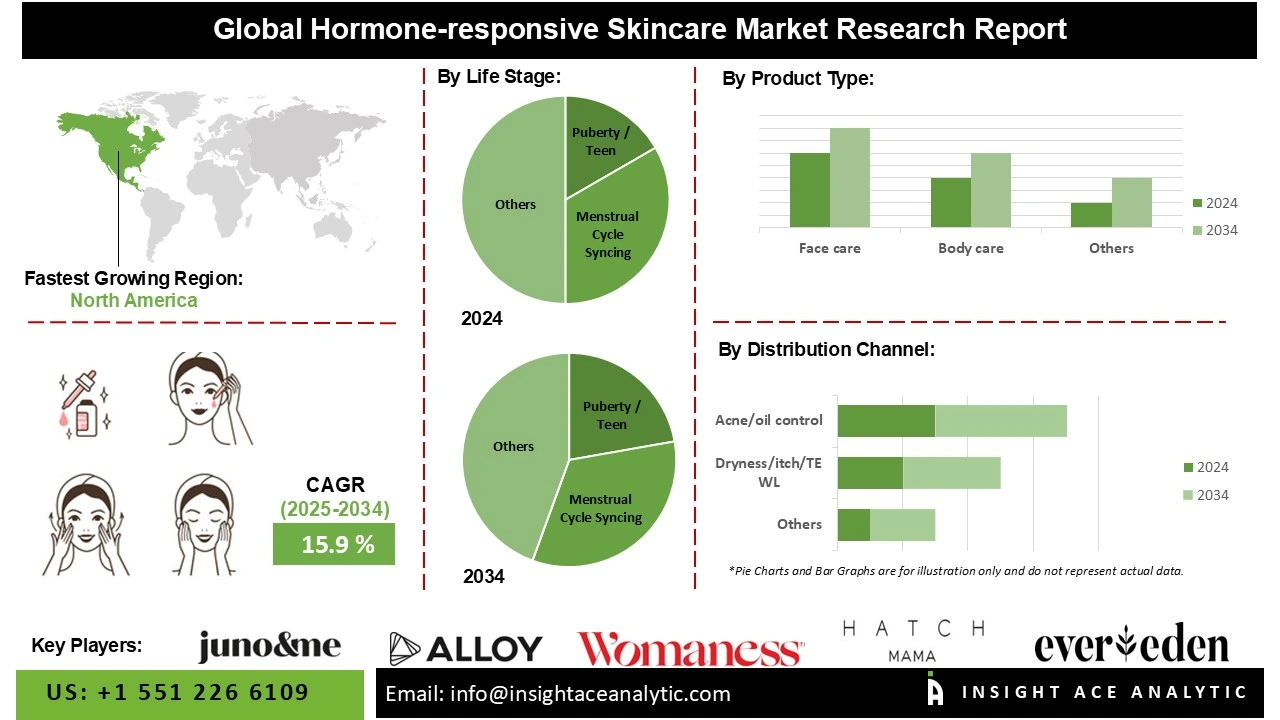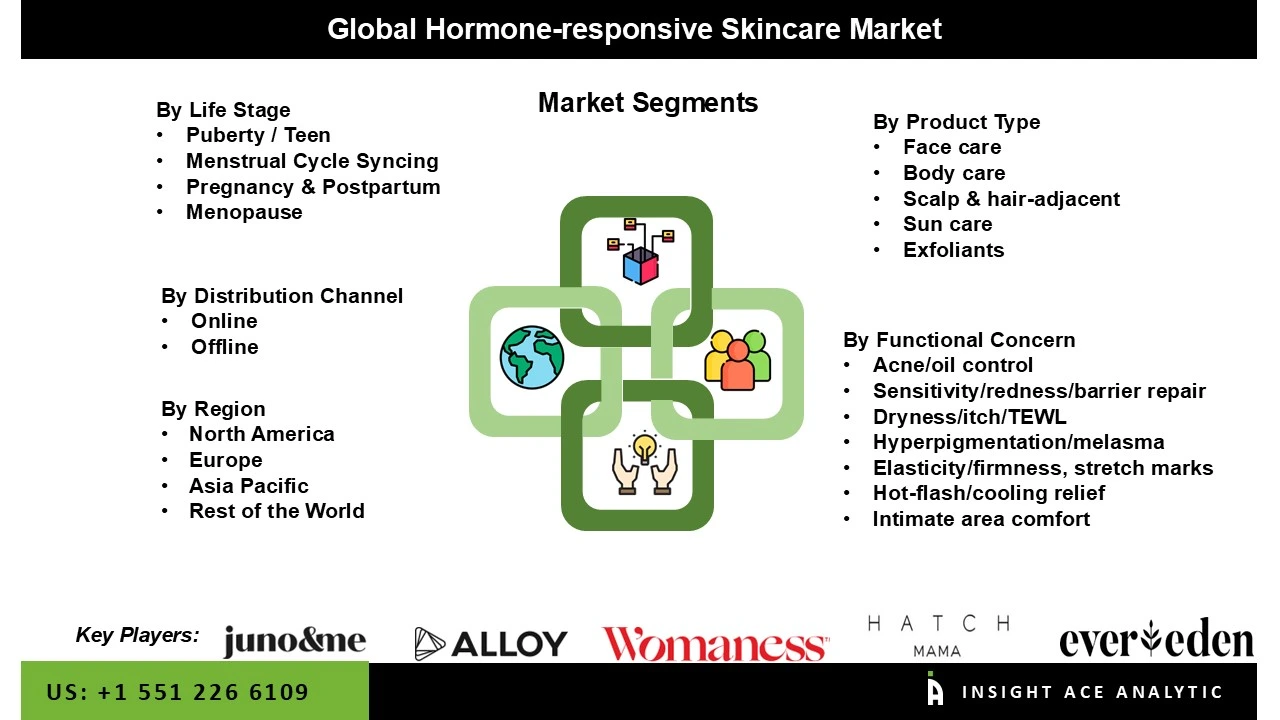Global Hormone-responsive Skincare Market Size is predicted to grow with a 15.9 % CAGR during the forecast period for 2025-2034.
Hormone-Responsive Skincare Market, Share & Trends Analysis Report, By Life Stage (Puberty / Teen, Menstrual Cycle Syncing, Pregnancy & Postpartum, Menopause), By Product Type (Face Care, Body Care, Scalp & Hair-Adjacent, Sun Care, Exfoliants), By Functional Concern, By Region, and Segment Forecasts, 2025-2034.

Hormonal skincare, also known as hormone-responsive skincare, is a method that focuses on changes in the skin caused by hormonal shifts during various life phases, including puberty, menstruation, pregnancy, menopause, or times of stress and imbalance. This skincare approach utilizes specific products and chemicals to address issues such as acne, dryness, hyperpigmentation, sensitivity, or loss of firmness, as hormones like estrogen, progesterone, testosterone, and cortisol directly impact hydration, elasticity, sensitivity, and oil production.
For instance, estrogen promotes the production of collagen, elastin, and hyaluronic acid, which helps maintain the skin's plumpness, hydration, and elasticity. Conversely, low estrogen levels following menopause can cause wrinkles and thinner, drier skin. Avoiding endocrine-disrupting chemicals (EDCs), such as parabens, phthalates, and oxybenzone, is another key component of hormone-responsive skincare. These chemicals can mimic or interact with hormones, potentially exacerbating imbalances and skin problems.
The hormone-responsive skincare industry is a refined and rapidly expanding segment of the broader beauty and wellness industry, driven by the growing awareness of the fundamental link between skin health and hormonal fluctuations. This market surpasses conventional, one-size-fits-all solutions by offering targeted products specifically designed to address skin concerns directly impacted by life stages, such as menstruation, pregnancy, perimenopause, and menopause. A demographic shift toward an ageing population desiring reliable solutions for menopausal skin, a rise in consumer education through digital platforms, and a demand for personalised, holistic wellness that combines dermatological science with nutraceutical insights are among the key growth drivers. Although the segment remains a niche, it is undergoing substantial growth, particularly in North America and Europe. It is characterised by a premium price point, a robust digital presence, and a convergence with broader trends in evidence-based, functional beauty, and personalization.
Some of the Major Key Players in the Hormone-responsive Skincare Market is :
· Spots & Stripes
· Alloy, Inc.
· Caire Beauty
· COSRX – AC Collection
· Daylily Paris
· Dr. Barbara Sturm – Microbiotic
· Earth Mama Organics
· Evereden
· Hatch Mama
· juno&me
· Kangaroo Mommy
· Mama & Kids – Natural Science
· Modern Age Skin, LLC
· Muhza
· No7 Menopause Skincare
· Nyrah Beauty
· Orimii Skincare
· Pipette
· Shiffa
· The Spoiled Mama
· Typology – Woman Periodic Serums
· VENeffect
· VICHY INC.
· Womaness
· Others
The hormone-responsive skincare market is segmented into life stage, product type, functional concern, and distribution channel. Based on the life stage, the market is segmented into puberty/teen, menstrual cycle syncing, pregnancy & postpartum, and menopause. Based on the product type, the market is divided into face care, body care, scalp & hair-adjacent, sun care, and exfoliants. Based on the functional concern, the market is divided into acne/oil control, sensitivity/redness/barrier repair, dryness/itch/TEWL, hyperpigmentation/melasma, elasticity/firmness, stretch marks, hot-flash/cooling relief, and intimate area comfort. Based on the distribution channel, the market is divided into online, offline.
The face is especially vulnerable to hormonal fluctuations, often showing signs such as acne, oiliness, dryness, and hyperpigmentation, which makes facial skincare the dominant segment in the hormone-responsive skincare market. This category includes products like cleansers, serums, moisturizers, and masks that directly target these concerns, with multifunctional options such as SPF-infused moisturizers or serums for pigmentation and hydration gaining strong consumer appeal. Since facial skin is both highly visible and sensitive, consumers tend to prioritize it, driving brands to develop specialized hormone-responsive solutions. Rising awareness of how hormones affect the skin, amplified by social media and influencer culture, has further fueled demand for products that address conditions like melasma or hormonal acne. Additionally, the emphasis on “hormone-safe” formulations free from endocrine-disrupting chemicals has reinforced the face care segment’s leading role in shaping this market.
The acne/oil control segment plays a pivotal role in driving the hormone-responsive skincare market, as it tackles one of the most prevalent and visible outcomes of hormonal fluctuations excess sebum production and acne breakouts. Hormonal acne, triggered by elevated androgen levels during puberty, menstruation, pregnancy, or periods of stress, leads to increased oil secretion and clogged pores, making it a widespread concern across diverse demographics. Teenagers, women undergoing menstrual or menopausal changes, and men experiencing androgen-driven oiliness all represent key consumer groups fueling demand in this segment. Acne/oil control products are increasingly formulated to deliver multifunctional benefits, combining oil regulation with anti-inflammatory or even anti-aging properties to meet evolving consumer expectations. Innovations such as mattifying moisturizers with SPF exemplify this trend, offering solutions that not only control oil and prevent breakouts but also provide sun protection, seamlessly addressing both hormonal and lifestyle-related skin needs.
North America leads the hormone-responsive skincare market due to a combination of high consumer spending on premium skincare, strong awareness of hormonal skin concerns, and advanced R&D capabilities. The region benefits from access to AI-driven personalization technologies, such as skin analysis tools, which enhance the customization of products targeting issues like acne, melasma, and menopausal skin changes. A well-established dermatology and wellness industry further supports the adoption of hormone-responsive solutions, while growing investment in R&D drives the development of clean, hormone-safe formulations free from endocrine disruptors, in line with clean beauty trends. Additionally, the region’s emphasis on inclusivity, catering to diverse demographics including men, along with its focus on innovation and safety, continues to strengthen North America’s dominant position in this emerging market.
· In July 2025, Alloy announced the upcoming launches of two new skincare products: M4 Lift & Renew Rx Eye Cream and M4 Smooth & Firm Rx Priming Serum. This product expansion aligns with Alloy's cumulative funding of $16.3 million to date, underscoring the growing investor confidence in the brand's mission to lead the emerging hormone-responsive skincare market for women over 40. The new products will be incorporated into Alloy's prescription-based skincare platform, which is specifically designed to mitigate the visible effects of estrogen decline on the skin during perimenopause and menopause.
· In May 2025, HATCH Mama has formally entered the national retail market by forming a strategic partnership with Ulta cosmetic, the largest cosmetic retailer in the United States. This retail expansion is a component of HATCH Mama's overarching strategy to promote maternity wellness by ensuring that elevated, pregnancy-safe skincare is widely accessible at a reputable beauty destination. HATCH Mama addresses a critical void in the retail market by collaborating with Ulta Beauty, which has long been underserved by conventional skincare offerings for expectant and postpartum mothers.
· In May 2022, Womaness announced its new alliance with Ulta Beauty, the biggest beauty shop in the country. Womaness is available online and in a few Ulta Beauty locations as part of The Wellness Shop, a carefully chosen selection of wellness and self-care items for the body, mind, and soul. By giving consumers access to and visibility of products that expressly address the requirements of women over 40—a demographic that is frequently disregarded the alliance marks a significant turning point in the retail industry.
| Report Attribute | Specifications |
| Growth Rate CAGR | CAGR of 15.9 % from 2025 to 2034 |
| Quantitative Units | Representation of revenue in US$ Mn and CAGR from 2025 to 2034 |
| Historic Year | 2021 to 2024 |
| Forecast Year | 2025-2034 |
| Report Coverage | The forecast of revenue, the position of the company, the competitive market structure, growth prospects, and trends |
| Segments Covered | By Life Stage, Product Type, Functional Concern, Distribution Channel |
| Regional Scope | North America; Europe; Asia Pacific; Latin America; Middle East & Africa |
| Country Scope | U.S.; Canada; U.K.; Germany; China; India; Japan; Brazil; Mexico; The UK; France; Italy; Spain; China; Japan; India; South Korea; Southeast Asia; South Korea; South East Asia |
| Competitive Landscape | Spots & Stripes, Dr. Barbara Sturm – Microbiotic, COSRX – AC Collection, Muhza, Typology – Woman Periodic Serums, Faace – Period Faace, Evereden, Hatch Mama, Pipette, Daylily Paris, Mama & Kids – Natural Science, Kangaroo Mommy, Shiffa, Womaness, Alloy, No7 Menopause Skincare, Faace – Menopause Faace, juno&me |
| Customization Scope | Free customization report with the procurement of the report and modifications to the regional and segment scope. Particular Geographic competitive landscape. |
| Pricing and Available Payment Methods | Explore pricing alternatives that are customized to your particular study requirements. |
Global Hormone-responsive Skincare Market- By Life Stage
· Puberty / Teen
· Menstrual Cycle Syncing
· Pregnancy & Postpartum
· Menopause

Global Hormone-responsive Skincare Market – By Product Type
· Face care (cleansers, serums, moisturizers, eye/lip care, masks)
· Body care (belly oils, stretch-mark creams, body lotions, nipple/breast balms)
· Scalp & hair-adjacent (shedding, oil balance)
· Sun care (mineral SPF)
· Exfoliants (PHA, lactic, mandelic, low-% salicylic)
Global Hormone-responsive Skincare Market – By Functional Concern
· Acne/oil control
· Sensitivity/redness/barrier repair
· Dryness/itch/TEWL
· Hyperpigmentation/melasma
· Elasticity/firmness, stretch marks
· Hot-flash/cooling relief
· Intimate area comfort
Global Hormone-responsive Skincare Market- By Distribution Channel
· Online
· Offline
Global Hormone-responsive Skincare Market – By Region
North America-
· The US
· Canada
Europe-
· Germany
· The UK
· France
· Italy
· Spain
· Rest of Europe
Asia-Pacific-
· China
· Japan
· India
· South Korea
· Southeast Asia
· Rest of Asia Pacific
Latin America-
· Brazil
· Argentina
· Mexico
· Rest of Latin America
Middle East & Africa-
· GCC Countries
· South Africa
· Rest of the Middle East and Africa
This study employed a multi-step, mixed-method research approach that integrates:
This approach ensures a balanced and validated understanding of both macro- and micro-level market factors influencing the market.
Secondary research for this study involved the collection, review, and analysis of publicly available and paid data sources to build the initial fact base, understand historical market behaviour, identify data gaps, and refine the hypotheses for primary research.
Secondary data for the market study was gathered from multiple credible sources, including:
These sources were used to compile historical data, market volumes/prices, industry trends, technological developments, and competitive insights.

Primary research was conducted to validate secondary data, understand real-time market dynamics, capture price points and adoption trends, and verify the assumptions used in the market modelling.
Primary interviews for this study involved:
Interviews were conducted via:
Primary insights were incorporated into demand modelling, pricing analysis, technology evaluation, and market share estimation.
All collected data were processed and normalized to ensure consistency and comparability across regions and time frames.
The data validation process included:
This ensured that the dataset used for modelling was clean, robust, and reliable.
The bottom-up approach involved aggregating segment-level data, such as:
This method was primarily used when detailed micro-level market data were available.

The top-down approach used macro-level indicators:
This approach was used for segments where granular data were limited or inconsistent.
To ensure accuracy, a triangulated hybrid model was used. This included:
This multi-angle validation yielded the final market size.
Market forecasts were developed using a combination of time-series modelling, adoption curve analysis, and driver-based forecasting tools.
Given inherent uncertainties, three scenarios were constructed:
Sensitivity testing was conducted on key variables, including pricing, demand elasticity, and regional adoption.